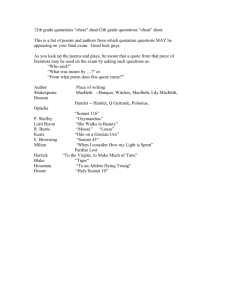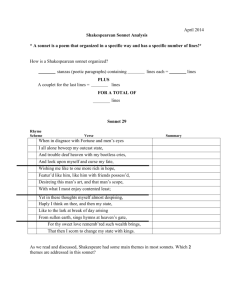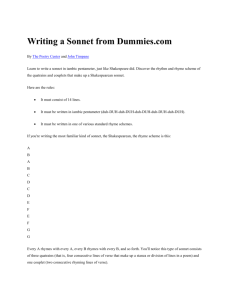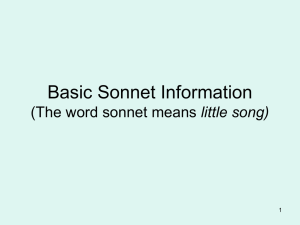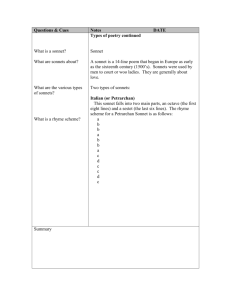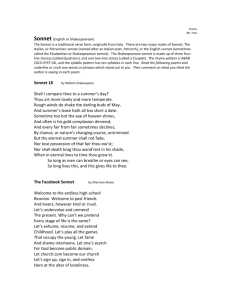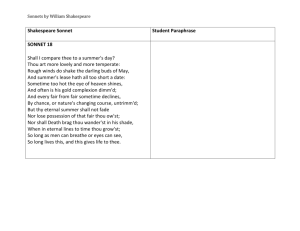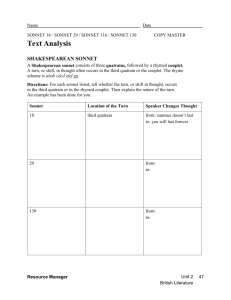The Shakespearen Sonnet
advertisement
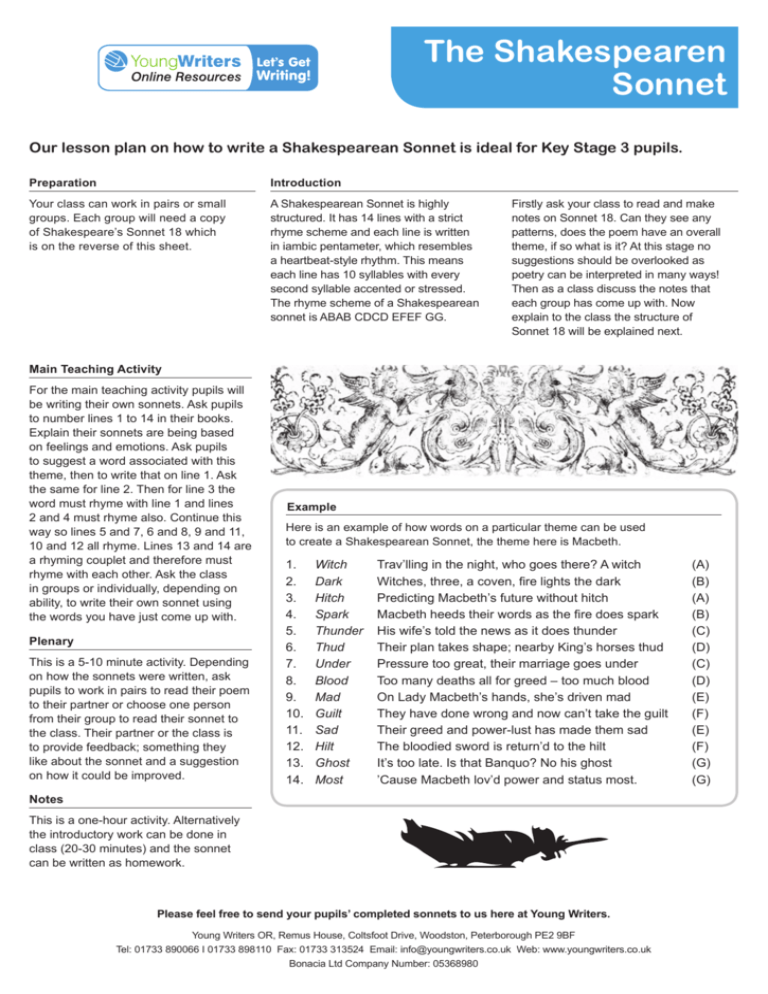
The Shakespearen Sonnet Our lesson plan on how to write a Shakespearean Sonnet is ideal for Key Stage 3 pupils. Preparation Introduction Your class can work in pairs or small groups. Each group will need a copy of Shakespeare’s Sonnet 18 which is on the reverse of this sheet. A Shakespearean Sonnet is highly structured. It has 14 lines with a strict rhyme scheme and each line is written in iambic pentameter, which resembles a heartbeat-style rhythm. This means each line has 10 syllables with every second syllable accented or stressed. The rhyme scheme of a Shakespearean sonnet is ABAB CDCD EFEF GG. Firstly ask your class to read and make notes on Sonnet 18. Can they see any patterns, does the poem have an overall theme, if so what is it? At this stage no suggestions should be overlooked as poetry can be interpreted in many ways! Then as a class discuss the notes that each group has come up with. Now explain to the class the structure of Sonnet 18 will be explained next. Main Teaching Activity For the main teaching activity pupils will be writing their own sonnets. Ask pupils to number lines 1 to 14 in their books. Explain their sonnets are being based on feelings and emotions. Ask pupils to suggest a word associated with this theme, then to write that on line 1. Ask the same for line 2. Then for line 3 the word must rhyme with line 1 and lines 2 and 4 must rhyme also. Continue this way so lines 5 and 7, 6 and 8, 9 and 11, 10 and 12 all rhyme. Lines 13 and 14 are a rhyming couplet and therefore must rhyme with each other. Ask the class in groups or individually, depending on ability, to write their own sonnet using the words you have just come up with. Plenary This is a 5-10 minute activity. Depending on how the sonnets were written, ask pupils to work in pairs to read their poem to their partner or choose one person from their group to read their sonnet to the class. Their partner or the class is to provide feedback; something they like about the sonnet and a suggestion on how it could be improved. Example Here is an example of how words on a particular theme can be used to create a Shakespearean Sonnet, the theme here is Macbeth. 1. 2. 3. 4. 5. 6. 7. 8. 9. 10. 11. 12. 13. 14. Witch Dark Hitch Spark Thunder Thud Under Blood Mad Guilt Sad Hilt Ghost Most Trav’lling in the night, who goes there? A witch Witches, three, a coven, fire lights the dark Predicting Macbeth’s future without hitch Macbeth heeds their words as the fire does spark His wife’s told the news as it does thunder Their plan takes shape; nearby King’s horses thud Pressure too great, their marriage goes under Too many deaths all for greed – too much blood On Lady Macbeth’s hands, she’s driven mad They have done wrong and now can’t take the guilt Their greed and power-lust has made them sad The bloodied sword is return’d to the hilt It’s too late. Is that Banquo? No his ghost ’Cause Macbeth lov’d power and status most. Notes This is a one-hour activity. Alternatively the introductory work can be done in class (20-30 minutes) and the sonnet can be written as homework. Please feel free to send your pupils’ completed sonnets to us here at Young Writers. Young Writers OR, Remus House, Coltsfoot Drive, Woodston, Peterborough PE2 9BF Tel: 01733 890066 I 01733 898110 Fax: 01733 313524 Email: info@youngwriters.co.uk Web: www.youngwriters.co.uk Bonacia Ltd Company Number: 05368980 (A) (B) (A) (B) (C) (D) (C) (D) (E) (F) (E) (F) (G) (G) Sonnet 18 by William Shakespeare Shall I compare thee to a summer’s day? Thou art more lovely and more temperate: Rough winds do shake the darling buds of May, And summer’s lease hath all too short a date: Sometime too hot the eye of heaven shines, And often is his gold complexion dimmed, And every fair from fair sometime declines, By chance, or nature’s changing course untrimmed: But thy eternal summer shall not fade, Nor lose possession of that fair thou ow’st, Nor shall death brag thou wander’st in his shade, When in eternal lines to time thou grow’st, So long as men can breathe, or eyes can see, So long lives this, and this gives life to thee. Young Writers OR, Remus House, Coltsfoot Drive, Woodston, Peterborough PE2 9BF Tel: 01733 890066 I 01733 898110 Fax: 01733 313524 Email: info@youngwriters.co.uk Web: www.youngwriters.co.uk Bonacia Ltd Company Number: 05368980
